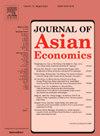数字化转型对就业影响的国际比较
IF 2.9
3区 经济学
Q1 ECONOMICS
引用次数: 0
摘要
本文的理论分析探讨了数字化转型对就业的影响及其传导机制。本文提出,市场规模、产业结构、劳动力结构等区域特征是影响数字化转型就业效应的重要因素。在实证研究方面,本文利用 68 个国家 2013-2019 年的经济面板数据分析了数字化转型的就业效应,结果发现1) 就就业而言,数字化转型主要受到替代效应的影响。在工资方面,数字化转型带来了工资上涨效应。2) 庞大的市场规模和先进的产业结构大大缓解了就业替代效应,增强了工资上涨效应。3)劳动力结构的技能化对数字化转型的就业替代效应没有显著影响,但会显著增强工资上涨效应。4) 发展中国家在数字化转型中的就业替代效应更为明显,而发达国家的工资增长效应更为突出。在解释变量中引入一期滞后和利用工具变量后,这些结果的稳健性得到了证实。本文的这些发现为在数字化转型背景下实现公平与效率之间的平衡提供了宝贵的启示。本文章由计算机程序翻译,如有差异,请以英文原文为准。
International comparison of the impact of digital transformation on employment
Theoretical analysis in this paper examines the impact of digital transformation on employment and its transmission mechanisms. It proposes that regional characteristics, such as market size, industry structure, and labor structure, are important factors influencing the employment effect of digital transformation. Empirically, this paper analyzes the employment effect of digital transformation using economic panel data from 68 countries spanning the years 2013–2019 and finds that: 1) In terms of employment, digital transformation is dominated by the substitution effect. In terms of wages, digital transformation presents wage-rising effects. 2) Large market size and advanced industry structure significantly mitigate the employment substitution effect and enhance the wage-rising effect. 3) The skillization of labor structure has no significant impact on the employment substitution effect of digital transformation, but it significantly enhances the wage-raising effect. 4) Developing countries experience a more pronounced employment substitution effect from digital transformation, while developed countries witness a more prominent wage-increasing effect. The robustness of these results has been confirmed after introducing a one-period lag in the explanatory variables and utilizing instrumental variables. These findings of this paper offer valuable insights for achieving a balance between equity and efficiency in the context of digital transformation.
求助全文
通过发布文献求助,成功后即可免费获取论文全文。
去求助
来源期刊

Journal of Asian Economics
ECONOMICS-
CiteScore
4.70
自引率
9.40%
发文量
90
期刊介绍:
The Journal of Asian Economics provides a forum for publication of increasingly growing research in Asian economic studies and a unique forum for continental Asian economic studies with focus on (i) special studies in adaptive innovation paradigms in Asian economic regimes, (ii) studies relative to unique dimensions of Asian economic development paradigm, as they are investigated by researchers, (iii) comparative studies of development paradigms in other developing continents, Latin America and Africa, (iv) the emerging new pattern of comparative advantages between Asian countries and the United States and North America.
 求助内容:
求助内容: 应助结果提醒方式:
应助结果提醒方式:


